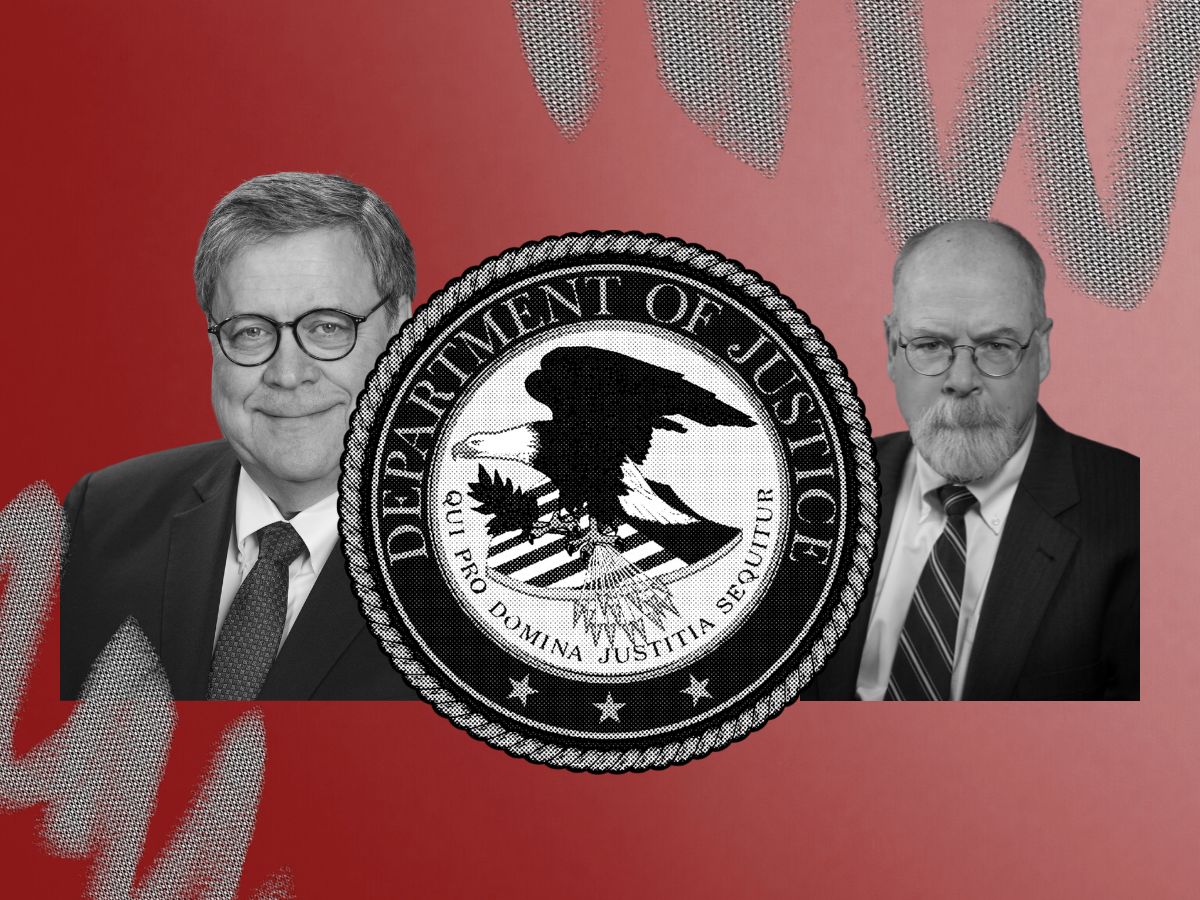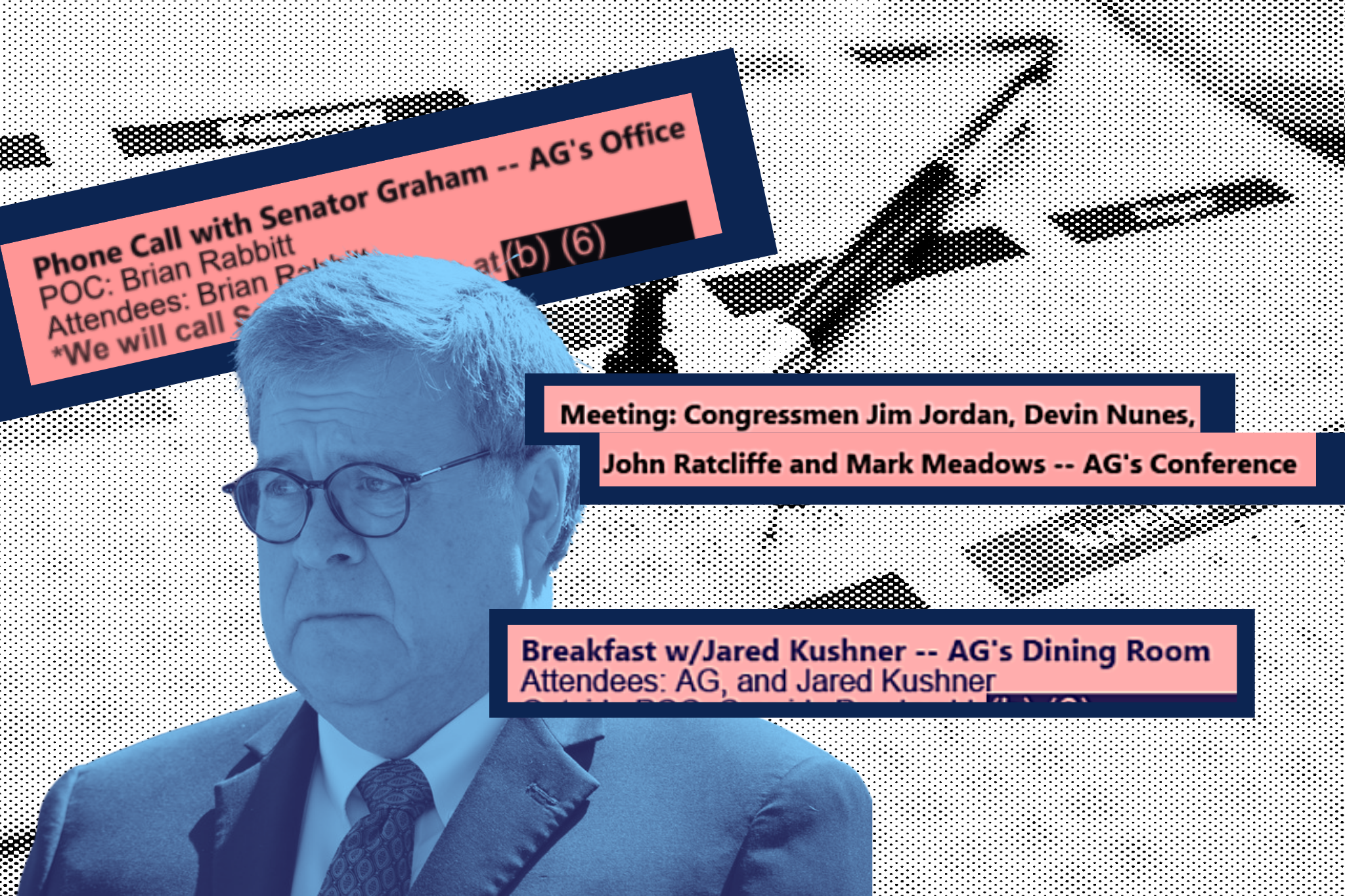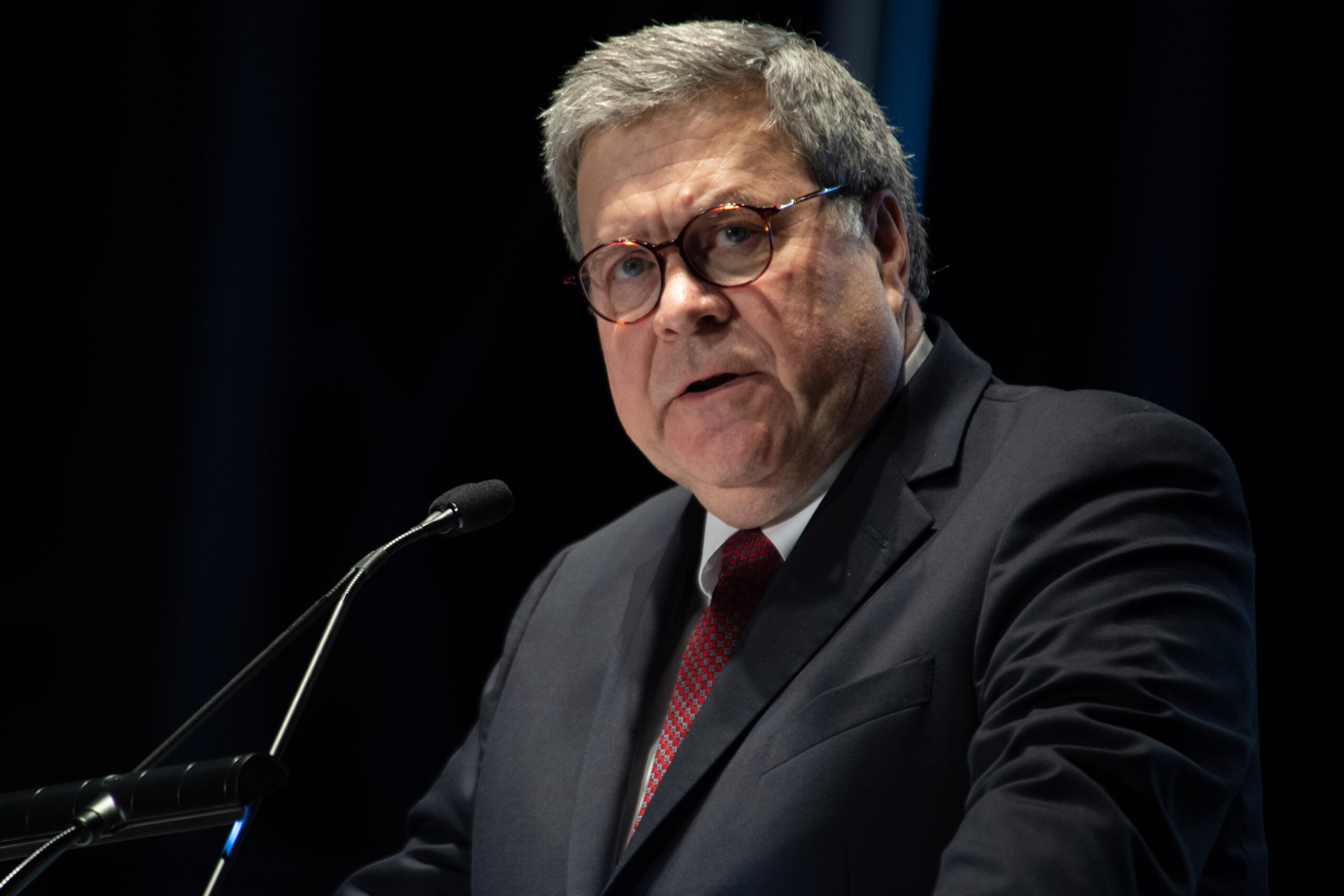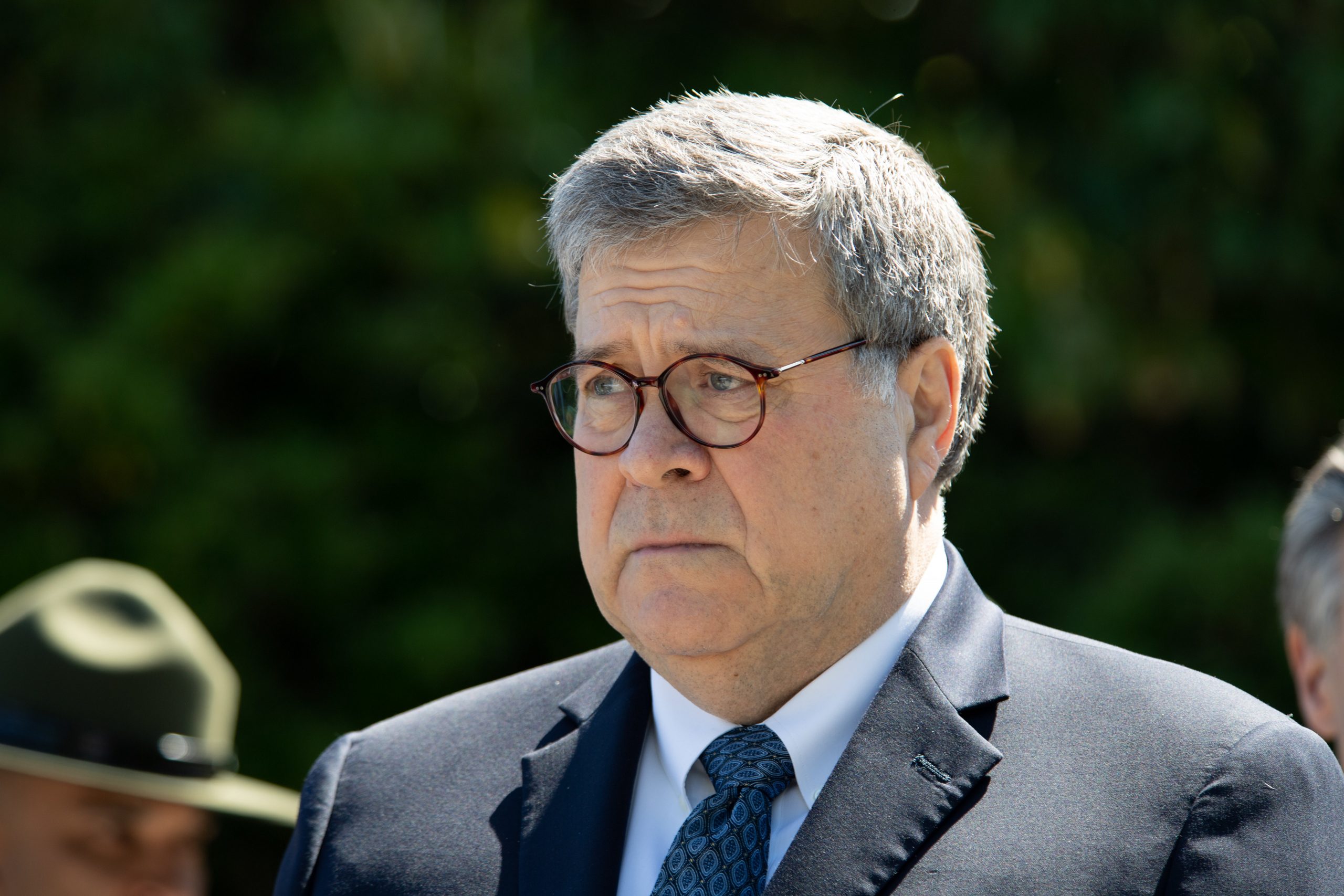
John Durham’s Politicized Investigation — And William Barr’s Role in It
Shortly after Mueller wrapped up his Russia investigation, the attorney general announced a new inquiry — one that would examine the origins of Mueller’s investigation and would be led by federal prosecutor John Durham. Both Barr’s previous criticism of Mueller’s probe as well as his problematic public comments since announcing the new inquiry have raised serious concerns about transparency, misconduct, and the political motivations behind Durham’s investigation.

Even before he joined the Trump administration as attorney general, William Barr’s stance on Special Counsel Robert Mueller’s investigation into Russian election interference was well-documented. In 2018, while a private citizen (who had also interviewed to be President Donald Trump’s personal attorney), Barr sent then-Deputy Attorney General Rod Rosenstein a memo outlining his misgivings about the Mueller investigation. (According to documents obtained by American Oversight, Barr shared this memo with Rosenstein over text.)
When Mueller finished his investigation and issued a report detailing Russia’s efforts to aid Trump’s 2016 election chances, Barr wasted no time in submitting a distorted summary of Mueller’s findings and prompting the president to inaccurately declare that he had received “total exoneration.” A month later, Barr raised eyebrows when he stated during congressional testimony that “spying [on the Trump campaign] had occurred,” implying illegitimate actions on the part of the FBI. And a month after that, Barr announced that U.S. Attorney John Durham would be leading an investigation into the origins of the Russia probe, which was criticized as a political effort to delegitimize Mueller’s findings.
American Oversight began looking into the Durham inquiry as part of our broader investigation into the politicization of the Justice Department. Our investigation has uncovered records showing multiple meetings between Barr and Durham around the time of the release of the Mueller report — including one just a day after Barr sent his summary to Congress. “The frequency of their face-to-face meetings during this critical time — while Mueller’s office wrapped up its work — raised questions for several former Justice Department lawyers,” wrote CNN in reporting on those records.
Additionally, the records obtained by American Oversight also reveal that Seth DuCharme, then a counselor to the attorney general, was also present at several of those meetings. DuCharme is now the U.S. attorney for the Eastern District of New York (EDNY), in Brooklyn, having swapped places with Richard Donoghue. While at EDNY, an office that has been investigating multiple cases involving Trump associates, Donoghue had been tasked by Barr with overseeing all Ukraine-related investigations.
Meanwhile, Barr’s public comments about the progress of Durham’s inquiry not only fly in the face of Justice Department policy disfavoring such statements; they also make the agency’s justification for withholding documents from public release — that they are exempt from disclosure because they relate to an “ongoing investigation” — seem hypocritical and potentially political. Barr’s July 2020 refusal to commit to waiting until after the presidential election to release the findings of Durham’s probe further deepens the tinge of politicization.
American Oversight is continuing to investigate Durham’s probe and to fight for the release of documents that can provide more information on how Durham’s work was shaped. Below is a timeline of related records we’ve obtained along with public news reports.
TIMELINE OF DURHAM’S INVESTIGATION AND BARR’S INVOLVEMENT
March 22, 2019: Mueller report submitted to Attorney General Barr.
March 25, 2019: Meeting of John Durham, Barr, then-Chief of Staff Brian Rabbitt, Seth DuCharme, then-Counselor Will Levi, and the Justice Management Division.
April 9, 2019: DuCharme arranged a time to talk with Durham and Barr. “John, the AG has made me aware of the [redacted] that you are working on with him and he asked me to provide you with my support and assistance.”
April 10, 2019: During a Senate hearing, Barr said that he believed spying on the Trump campaign by the FBI “did occur,” and that he would be looking into the issue.
April 12, 2019: In an email to Durham and Inspector General Michael Horowitz, DuCharme offered “to explain what John [Durham] and [redacted] and I are working on.”
April 25, 2019: Durham, Barr, Rabbitt, DuCharme and DOJ official John Moran held a meeting.
April 30, 2019: Durham, Barr, Rabbit, and DuCharme held a meeting.
May 13, 2019: The New York Times reported that Barr had assigned Durham “to examine the origins of the Russia investigation.”
May 14, 2019: The New York Times reported that Durham’s assignment would be a review, rather than a criminal inquiry, of intelligence-collection activities related to the Trump campaign. According to the Times, Barr had “asked Mr. Durham to oversee that review several weeks ago” and was “taking a personal role in it,” discussing it with CIA Director Gina Haspel, FBI Director Christopher Wray, and then-Director of National Intelligence Dan Coats.
May 14, 2019: Durham, Barr, Rabbitt, and DuCharme held a meeting.
May 17, 2019: Barr made additional statements about the legitimacy of the Russia investigation, telling Fox News that he was questioning whether “government officials abused their power,” and telling the Wall Street Journal, “Government power was used to spy on American citizens.”
May 22, 2019: Barr requested a meeting with Durham. They met that day, along with Rabbitt.
May 23, 2019: Trump ordered the CIA and other intelligence agencies to cooperate with the review of the Russia investigation’s origins, and gave Barr the authority to unilaterally declassify documents.
May 28, 2019: DuCharme sent Durham a copy of the presidential declassification memo about the Justice Department’s review of intelligence activities relating to the 2016 campaign. “For your files,” he wrote.
May 31, 2019: In an interview with CBS, Barr said that “the use of foreign intelligence capabilities and counterintelligence capabilities against an American political campaign to me is unprecedented and it’s a serious red line that’s been crossed,” and that he wanted to “make sure” counterintelligence activities were “legitimate.”
June 4, 2019: Durham, Barr, Rabbitt, and DuCharme held a meeting.
June 12, 2019: The New York Times reported that Justice Department officials intended to interview senior CIA officers. Haspel reportedly told CIA officials that speaking with Durham was consistent with cooperating with Barr’s investigation.
June 26, 2019: Durham, Barr, Rabbitt, DuCharme, and then-U.S. Attorney for the District of Columbia Timothy Shea held a meeting.
July 11, 2019: Durham, Barr, Rabbitt, and DuCharme held a meeting.
July 12, 2019: Durham, Barr, Rabbitt, and DuCharme had a phone call.
July 16, 2019: Durham, Barr, Rabbitt, and DuCharme held a meeting.
July 26–Aug. 1, 2019: Barr traveled to the U.K. to attend bilateral meetings — according to press reporting, Barr was seeking Britain’s cooperation with Durham’s investigation.
Aug. 1, 2019: Durham, Barr, Rabbitt, and DuCharme held a meeting.
Aug. 6, 2019: Durham, Barr, Rabbitt, and DuCharme held a meeting.
Aug. 14–16, 2019: Barr traveled to Italy to meet with intelligence counterparts, reportedly to discuss Italy’s role in the events leading to the Russia investigation.
Aug. 16, 2019: Durham, Barr, Rabbitt, DuCharme, and Levi had a phone call.
Aug. 20, 2019: Durham, Barr, Rabbitt, and DuCharme held a meeting.
Aug. 27, 2019: DuCharme emailed Durham, “Just FYI, we had already called over to the FBI to set something up.”
Sept. 3, 2019: Durham, Barr, Rabbitt, DuCharme, and a JMD official held a meeting.
Sept. 6, 2019: Durham, Barr, Rabbitt, and DuCharme held a meeting.
Sept. 12, 2019: Durham, Barr, Rabbitt, and DuCharme held a meeting.
Sept. 25, 2019: Justice Department spokesperson Kerri Kupec said in a statement that “certain Ukrainians who are not members of the government have volunteered information to Mr. Durham, which he is evaluating.”
Sept. 25–28, 2019: Barr again traveled to Italy, with reports indicating that Durham also attended a meeting in which the attorney general asked the Italians to assist in Durham’s investigations.
Oct. 16, 2019: The New York Times reported that with his trip to Italy the previous month, Barr “had circumvented protocols in arranging the trip.” According to the Times, embassy officials found his visit “unusual,” as was the fact that Durham joined him. And an Italian official confirmed to the Times that one purpose of the visit was to gain more information on a professor whose actions had played a role in the FBI’s opening of an investigation into Russian election interference.
Oct. 17, 2019: Durham, Barr, Rabbitt, and DuCharme held a meeting.
Oct. 19, 2019: The New York Times reported that the number of interviews that had been conducted indicated that Durham’s review was “further along than previously known.” The Times also reported that then-acting White House Chief of Staff Mick Mulvaney had tied Durham’s probe with the Ukraine scandal, “put[ting] the spotlight on the fact that Ukraine is one country that Mr. Durham has sought help from.”
Oct. 24, 2019: The New York Times reported that the Durham review had been shifted to a criminal inquiry, giving Durham more powers to subpoena for testimony and documents, and that Durham was running the investigation with aide Nora R. Dannehy and two retired FBI agents.
Nov. 22, 2019: The New York Times reported that Michael Horowitz had referred to Durham certain findings regarding the wiretapping of former Trump campaign adviser Carter Page. According to the Times’ sources, the referral appeared “to be at least in part the basis for the elevation of Mr. Durham’s inquiry from an administrative review to a criminal investigation.”
Dec. 2, 2019: The New York Times published a story on Barr’s skepticism about the report from Horowitz’s office on the Russia investigation, writing that “Durham has already unearthed some evidence that supports Mr. Barr’s uncertainty of the inspector general’s findings, according to a lawyer involved in the Durham inquiry.”
Dec. 9, 2019: Durham released a statement disagreeing with the conclusions of Horowitz’s report.
Dec. 12, 2019: Barr gave multiple interviews regarding Horowitz’s report, including NBC, the Wall Street Journal, and Fox — as summarized by Lawfare. Barr said that Durham’s review was necessary to determine whether there was “improper motive,” and went so far as to say that he thought “there are episodes there that cannot be squared with innocent mistakes.” Barr also said he disagreed with Horowitz that a conversation between a Trump campaign adviser and an Australian diplomat could have been a legitimate basis of the Russia investigation.
Feb. 13, 2020: The New York Times published a story about how Durham was looking into whether the CIA and NSA had manipulated information about Russian election interference due to preconceived notions, or had hid that information from other agencies.
April 10, 2020: In an interview with Fox News’ Laura Ingraham, Barr said the FBI’s Russia counterintelligence probe was one of the “greatest travesties in American history,” that it began “without any basis,” and that what happened after the election was a pattern of events “to sabotage the presidency.”
April 21, 2020: During a radio interview with Hugh Hewitt, Barr said, “I think the reason that we have this investigation is because there are a lot of things that are unexplained. And I think we’re getting deeply into the situation, and we’ll be able to sort out exactly what happened.”
April 24, 2020: The New York Times reported that Durham’s investigators were also looking into leaks to news media. The article also reported that Barr had recently said that Durham had uncovered “troubling” issues, and that Durham’s findings could be made public before the November election. In addition to Dannehy, the Times also named a number of other prosecutors working with Durham.
May 12, 2020: In an interview with CBS, Barr confirmed that issues related to former National Security Adviser Michael Flynn were also in Durham’s “portfolio.”
May 18, 2020: During a news conference, Barr said that Durham was looking into potential crimes, but that he was focused on other people, not former President Barack Obama or former Vice President Joe Biden.








